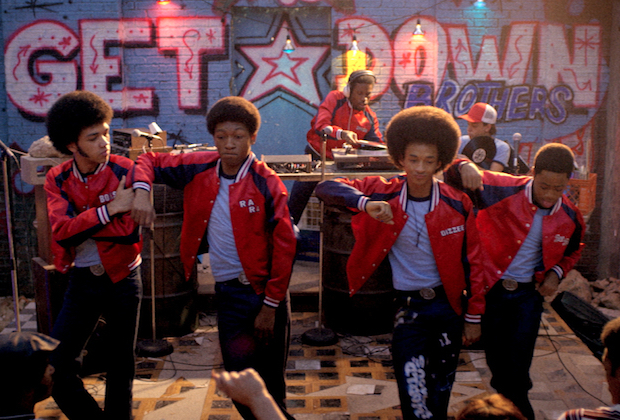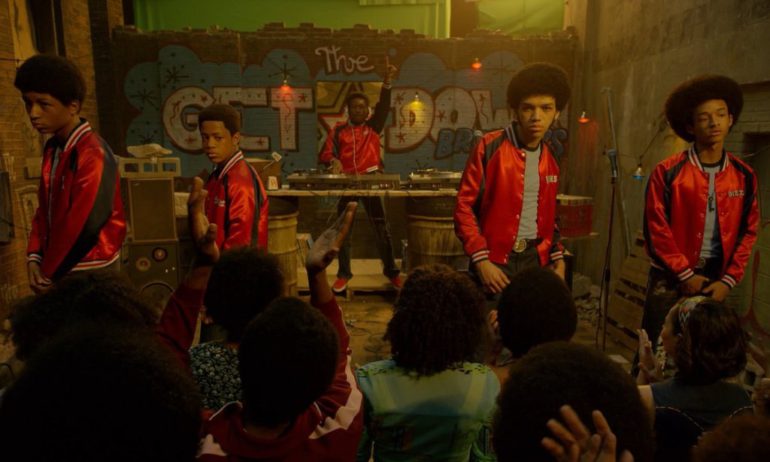I don’t watch a lot of TV. I’d rather hear my clever punchlines and dramatic narratives laid over a funky beat, where I can bop my head to it instead of staring at a screen. But in February 2015, fresh off Beyonce’s second Album of the Year defeat, Netflix announced they were creating a series centered around the birth of hip-hop in the streets of the Bronx, and I knew I’d found my binge watching obsession.
Twenty-eight months and 11 episodes later, Beyonce still hasn’t won an Album of the Year award at the Grammys, and The Get Down has been cancelled.
In hindsight, it’s easy to see how the move was coming. Netflix had already sunk $120 million into the first season, which was hampered with delays and glitches long before it debuted. Director Baz Luhrmann was leery about coming back to work on a second season after the first had dominated his entire schedule. But when you look at the impact the series had made and the potential it had to grow even further, it still cuts like a blade. And the fact that it’s the first Netflix show to be cancelled after just one season only twists it in further.
From the get-go, the show had the blessing of hip hop royalty. Grandmaster Flash himself taught his character the art of DJing, and helped Luhrmann make sure all the details were accurate to the time period, all the way down to the speakers. Nas, who wrote many of the show’s raps and poems, served as executive producer and even voiced many of the episode introductions.
Even with the numerous production issues, Netflix and Sony stayed on board with Luhrmann and his lavish vision, to their credit. The bond between hip-hop and the big screen has been especially strong in recent years, with projects like 50 Cent’s Power, Fox’s hit drama Empire, and Oscar nominated movie Straight Outta Compton finding success among fans and critics alike. The Get Down promised to be the next iteration of this trend, featured prominently on the platform redefining the TV and film industries. People could see themselves in the characters, people who had grown accustomed to living on the fringes of mainstream entertainment. Jada Gomez voiced this sentiment on Twitter after the cancellation announcement, and lauded the cast and crew for what they had created.
If you look at film or TV from the early '80s, my parents are virtually written out of pop culture. While black and Latino kids defined it.
— Jada Gomez (@JadaGomez) May 25, 2017
#TheGetDown actually put what I've grown up hearing all my life on display. Kudos to what they accomplished, wish it could have been longer.
— Jada Gomez (@JadaGomez) May 25, 2017
And I have never seen a Black and Puerto Rican character talk about that dichotomy like Books. Thank you @JusticetheSmith. ❤️🙌🏽 #TheGetDown
— Jada Gomez (@JadaGomez) May 25, 2017
The Get Down aspired to be what Black America in general aspires to be: authentic, unapologetic, and undeniably important. It was a glimpse into the creation of the world that myself and many others have so readily immersed ourselves in, and a tribute to those who sparked the movement. It was always unclear what the show would look like moving forward; the expected plotline spanned decades, and the characters would inevitably age out of their respective actors before long. Keeping up with all the various storylines would become a headache, and the writers would have to figure out a way to focus on the prominent ones while believably resolving several others.

Now, however, the show’s future is muddier than ever, even in the eyes of its director. Luhrmann wrote in a Facebook post to his broken-hearted fans that a re-up of the show in the near future was “unlikely to happen,” dumping off the continuation of the narrative to the audience members themselves. If this is truly the end, the brief run will at least help springboard the talented actors higher; Shameik Moore (Shaolin Fantastic) will be voicing Spider Man in the upcoming animated movie, and Skylar Brooks (Ra-Ra) landed a role in the upcoming sci-fi thriller The Darkest Minds.
Still, seeing the individual stars shine elsewhere will serve a cruel reminder of what could have been in upcoming seasons. While they venture off to find greener pastures, their fictional counterparts will likely live on only in memory. So farewell, Get Down Brothers, at least we can find peace knowing hip-hop in the real world made it farther than the show.


